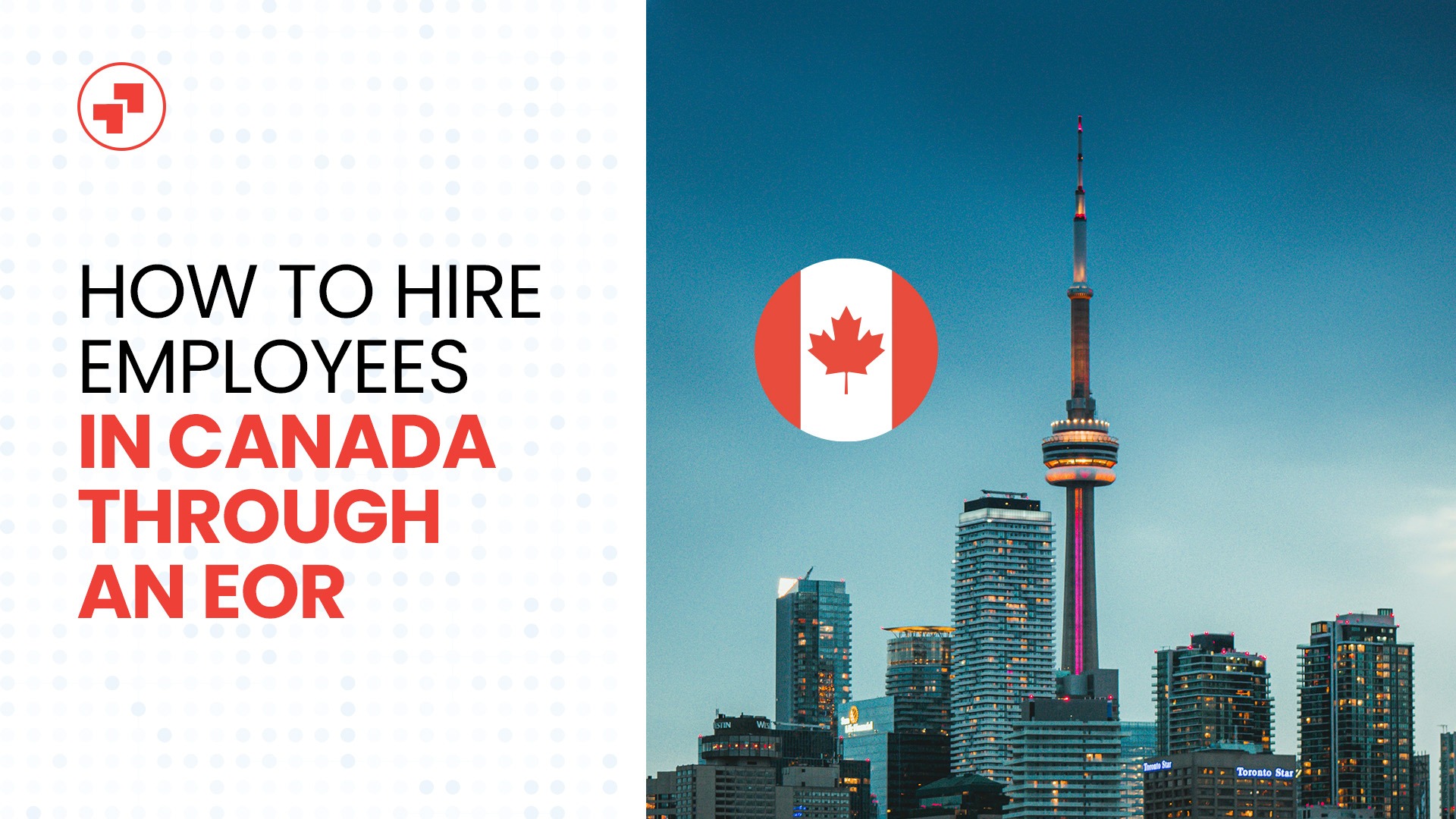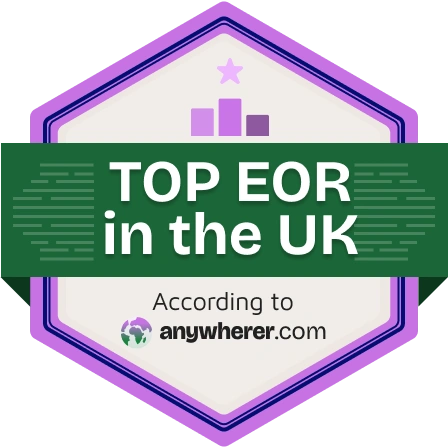KEY TAKEAWAYS
-
Hiring in Canada via an EOR lets you onboard talent quickly without setting up a local legal entity, saving time and legal hassle.
-
PamGro’s EOR service handles compliance, payroll, HR, and contracts across all Canadian provinces, simplifying cross-border hiring.
-
Canada offers a skilled, educated workforce with favorable immigration policies, making it a prime location for global recruitment.
-
Labor laws vary by province—an EOR ensures your employment contracts, wages, and leave policies remain fully compliant.
-
PamGro enables companies to hire in days instead of months and provides transparent flat-rate pricing with no hidden fees.
-
Employers must comply with minimum wage, tax contributions, and employee benefits regulations—EORs help you meet all requirements.
-
PamGro’s in-house experts manage onboarding, IP protection, tax filings, and bilingual support, with no reliance on third-party vendors.
-
Employee misclassification in Canada can lead to fines and audits; an EOR helps you avoid these risks by ensuring correct worker status.
-
The cost of using an EOR in Canada typically ranges from $599 to $2,000+ per employee/month, depending on scope and provider.
-
PamGro is ideal for companies that want to expand into Canada compliantly, manage global payroll easily, and build local teams quickly.
Imagine this: your business is scaling fast and you’ve found the perfect software developer in Toronto. But now you’re stuck navigating complex employment laws, payroll taxes, compliance risks and cross-border legal obligations. Setting up a legal entity just to onboard one or two employees feels excessive — not to mention time-consuming and expensive. Setting up a legal entity in Canada can take months and requires compliance with complex provincial laws.
Sound familiar?
You’re not alone. Many high-growth companies hit this wall when expanding into Canada, often struggling to understand the local labor laws .
That’s where PamGro comes in.
We’re your employer of record in Canada — managing the legal, tax and HR responsibilities through our employer of record services, so you don’t have to. EOR services enable companies to quickly tap into Canadian talent without establishing local entities.
Why Hire in Canada?
Canada isn’t just maple syrup and hockey. It’s also home to a highly educated workforce, a strong economy and favorable immigration policies. More than 50% of the population holds a post-secondary education, making it an attractive destination for businesses seeking skilled talent. Here’s why more companies are tapping into Canadian talent in the growing Canadian market:
- Diverse time zones & work culture – From the Atlantic to the Pacific, Canada’s six time zones allow for flexible, global collaboration.
- Competitive compensation required – Inflation and high living costs mean candidates expect fair pay. Canada employers must comply with minimum wages and compensation standards set by law, which vary by province. PamGro helps structure equitable packages that attract top-tier talent.
- Favorable immigration programs – Canada’s Global Talent Stream & Express Entry programs make it easier to onboard international talent.
- Labor law complexity by province – Each region has unique employment laws. PamGro ensures compliance across jurisdictions without the headache.
- Strategic trade access – Canada’s location offers access to significant trade agreements with major economies, including the US.
EOR vs. Entity Setup in Canada
| Criteria | Employer of Record (EOR) | Legal Entity Setup |
|---|---|---|
| Speed | Hire in days | Takes months |
| Cost | Flat monthly fee (significant cost savings compared to setting up a legal entity) | Legal, admin & compliance overhead |
| Compliance | Covered by PamGro experts (EOR ensures compliant employment contracts in accordance with Canadian law) | Your team must manage all risks |
| Control | Shared with PamGro | Full ownership |
| Scalability | Ideal for small to mid-sized teams | Better for long-term, large investments |
How to Hire Canadian Employees Using an Employer of Record (EOR)?
Here’s your step-by-step guide to hiring the right way—without the headaches. An Employer of Record (EOR) simplifies hiring employees and employing workers in Canada by managing compliance, payroll, and onboarding processes:
- Determine your hiring needs and the roles you want to fill.
- Choose a reputable EOR provider with experience in Canada.
- The EOR handles legal compliance, contracts, and payroll setup.
- Employee onboarding is streamlined by the EOR, ensuring all new hires are integrated efficiently and in compliance with Canadian regulations.
- Monitor employee performance and maintain communication through the EOR platform
1. Assess Your Hiring Needs and EOR Options
Start by identifying:
- What kind of roles you want to fill
- Your budget and compensation expectations
- Whether you need full-time, part-time or contract roles
Then, evaluate EORs based on:
- Local presence (Do they own their own entity in Canada?)
- Expertise in payroll, compliance and worker classification
- Bilingual (English/French) support
2. Ask the Right Questions Before You Choose
Use this checklist when evaluating EOR providers:
- Does the EOR own a legal entity in Canada or work with third parties?
- Are payroll and tax experts available in-house?
- Can they support your IP and data security requirements?
- Do they offer competitive benefits for Canadian employees?
With PamGro, you get full transparency, in-house payroll experts skilled in payroll processing, and locally compliant hiring without third-party vendors. Employers also benefit from localized employment contracts and tailored benefits through EOR services in Canada.
3. Check the EOR’s Reputation
Don’t just take their word for it. Look for:
- Client testimonials and Google reviews
- Third-party discussion boards or HR communities
- Proof of compliance and data security certifications
PamGro is trusted by hundreds of global clients —a mark of transparency and compliance, which extends to our employment agreements
4. Evaluate the Employee Experience
The right EOR isn’t just about protecting your business—it’s about delighting your employees through comprehensive employee benefits. Effective employee benefits management is crucial, ensuring that all benefits are customized and compliant with Canadian standards.
Ask:
- Is the EOR platform user-friendly?
- Do employees receive timely and accurate pay in Canadian dollars for compliance and convenience?
- Is there a clear onboarding flow and responsive HR support?
With PamGro, onboarding is seamless, queries are resolved quickly and your team in Canada feels like an extension of your core business.
5. Build a Competitive Compensation Package
Canadian talent values:
- Strong healthcare and retirement benefits, such as a registered retirement savings plan
- Work-life balance
- Salary transparency
Partner with PamGro to create an equitable, local-market-aligned compensation plan—while we ensure IP protections and data security are built in from day one.
What’s the Cost of Using an Employer of Record in Canada?
The cost of hiring through an employer of record Canada partner varies based on:
- Location of your employees within Canada (each Canadian province has unique employment laws, payroll obligations, and tax structures)
- Number of employees you’re hiring
- Service scope – e.g., do you need contractor management, global mobility or benefits administration?
- Type of EOR – does the provider own a local entity or depend on third-party vendors?
An EOR also manages the preparation and filing of required tax forms, including employment health tax where applicable.
Typical EOR Pricing in Canada
- Low end: $599 per employee/month
- Mid-range: $1,000–$1,500 per employee/month
- High end: $2,000+ per employee/month
Be cautious with ultra-low-cost providers—they may:
- Outsource to third parties with limited control
- Hide additional charges (onboarding fees, offboarding, benefits admin)
- Provide weak compliance support or security infrastructure
At PamGro, we offer flat-rate pricing with zero hidden fees and 100% compliance, ensuring your employer of record costs are predictable and your hiring is worry-free.
Minimum Wage Requirements in Canada
Minimum wage requirements in Canada are set by each province and territory, typically ranging from $13 to $16 per hour. Employers must ensure that all Canadian employees receive at least the minimum wage mandated by local labor laws. The Canada Revenue Agency (CRA) enforces these regulations, and non-compliance can result in significant penalties, fines, and potential legal disputes. Navigating the patchwork of minimum wage laws across Canadian provinces can be challenging, but Employer of Record providers help businesses stay compliant by monitoring changes in labor laws and ensuring that payroll practices meet or exceed local minimum wage standards.
Curious if an EOR is the right fit for your global hiring plans?
Employment contracts and agreements in Canada
Employment Contracts in Canada
In Canada, employment contracts are not just formalities—they’re legal documents that must meet federal and provincial standards.
Key elements every contract should include:
- Salary and benefits
- Probationary period (usually 3 months, but not mandatory)
- Termination clauses and notice periods
- Confidentiality, non-compete, and non-solicitation clauses
- Contract amendments
Fixed-term contracts are legal but less common due to liability. Most employers opt for open-term agreements for more flexibility and legal protection.
Labor Law Compliance in Canada
Compliance is not one-size-fits-all. In Canada, it is essential to comply with local employment regulations and local labour laws. While Canada has federal labor laws, most employment regulations are provincial and cover:
- Work hours and schedule notice requirements
- 4 days’ notice for schedule changes
- 24 hours’ notice for emergency call-ins
- Flexible work requests
- After 6 months, employees can request schedule changes
- Workers’ compensation
- Each province has its own system for job-related injuries
These differences mean noncompliance can happen easily—especially without a local legal team. Understanding employment law is crucial to avoid noncompliance and ensure your business meets all legal obligations.
Probationary Periods
In Canada, probationary periods are governed by provincial employment standards and usually last between 29 days to 6 months, depending on the province and the job. For example, in Ontario, employers can terminate employment without severance during the first 3 months, while other provinces may allow for longer probationary periods if defined in the employment contract.
Termination & Severance Pay
When it comes to termination and severance, Canadian labor law lays out specific rules to protect both employees and employers. Employers must provide written notice of termination or offer pay in lieu of notice. The statutory minimum notice periods vary based on how long the employee has worked with the company. Detailed termination laws vary by province, requiring employers to carefully navigate local regulations.
- Less than three months: No notice required
- Three months to one year: One week’s notice
- One to three years: Two weeks’ notice
- More than three years: One additional week per year of service, up to a maximum of eight weeks
Acceptable reasons for dismissal include misconduct, breach of workplace policies, redundancy, ongoing underperformance, or frustration of contract due to prolonged illness. Canadian laws encourage employers to focus on employee retention and constructive management approaches, such as providing opportunities for correction and working with underperforming staff, before considering immediate dismissal. In some cases, employees may also qualify for severance pay based on their tenure and the provincial laws that apply. Additionally, employees under federal regulation follow specific termination rules under the Canada Labour Code.
As your Employer of Record (EOR) in Canada, PamGro simplifies the complexities of probation, termination, and severance. We ensure full legal compliance with Canadian employment laws and help you navigate every step of the employment lifecycle with confidence, while emphasizing your legal responsibilities during termination and severance processes.
Taxes in Canada
Employer tax: 7.9% - 8.5%
- Pension plan – 5.45% – 5.9% depending on the province
- Employment insurance – 1.6% – 2.2% dependent on territory
- Employer Health tax – 0.98% – 4.3% dependent on territory
Employee tax: 5%-62%
- Canada pension plan: 5.45% – 5.9%, dependent on territory
- Employment insurance – 1.18% – 1.58% dependent on territory
- Income tax: Income taxes in Canada are levied on both federal and provincial/territorial levels.
| GROSS INCOME | PROGRESSIVE TAX RATE |
|---|---|
| Up to $55,867 | 15% |
| $55,868 – $111,733 | 20.5% |
| $111,734 – $173,205 | 26% |
| $173,206 – $246,752 | 29% |
| More than $246,752 | 33% |
Leave and Public Holidays
Annual leave and paid time off
Vacation Leave: Employees are entitled to a minimum of two weeks of paid vacation per year if they’ve worked for less than five years with the same employer. This increases to three weeks after five years of continuous service, and four weeks after 10 years.
Statutory Benefits: Employees are entitled to paid time off for national and provincial statutory holidays (such as Canada Day, Labour Day, etc.).
Sick leave: Federally regulated employees are entitled to three days of paid sick leave after three months of service. Some provinces mandate more generous sick leave policies, with up to 10 days of paid sick leave annually. However, sick leave in Canada typically does not include paid leave in all cases, with specifics varying by province.
Bereavement leave: Most provinces require employers to provide 3 to 5 days of unpaid leave following the death of an immediate family member.
Maternity and parental leave: Employees are entitled to up to 17 weeks of maternity leave and up to 63 weeks of parental leave, depending on eligibility. These leaves are job-protected and may be partially covered by Employment Insurance (EI).
Family responsibility leave: Several provinces allow employees 3 to 5 days of unpaid leave annually to attend to the health or care needs of a family member.
Compassionate care leave: Federally regulated employees may take up to 28 weeks of unpaid leave to care for a critically ill family member.
Public holidays
- New Year’s Day – January 1
- Good Friday – Friday before Easter Sunday – late March/early April
- Easter Monday – Monday after Easter Sunday
- Victoria Day – Monday preceding May 25
- Canada Day – July 1
- Labor Day – Monday of the first week in September
- National Day for Truth and Reconciliation – September 30
- Thanksgiving Day – Second Monday in October
- Remembrance Day – November 11
- Christmas Day – December 25
- Boxing Day – December 26
Health Insurance Options for Employees
-
While Canadian employees benefit from access to public healthcare, many employers enhance their employee benefits packages by offering private health insurance. Providing private health insurance is a valuable way to attract and retain top talent in the competitive Canadian market. Employer of Record providers assist businesses in selecting and administering group health insurance plans or individual policies that comply with Canadian laws, including the Canada Health Act and provincial health insurance regulations.
By partnering with an EOR, companies can ensure their Canadian employees have access to comprehensive health insurance options, while also meeting all legal requirements for employee benefits and benefits administration. This approach not only supports employee well-being but also strengthens your company’s reputation as a competitive and compliant Canadian employer.
What are the risks of employee misclassification in Canada?
Whether accidental or intentional, misclassifying a full-time employee as a contractor can lead to:
- Hefty government penalties and fines
- Repayment of back wages and employer-paid benefits
- Lawsuits or government audits
- Damaged reputation and halted operations in Canada
In short, a single mistake can cost you thousands of dollars—and possibly your business presence in Canada.
Read More: The Expert Guide to Employee and Independent Contractor Misclassification
Why Choose PamGro’s Employer of Record in Canada?
- We own our Canadian entity, so there’s no third-party confusion.
- Flat, transparent pricing—no hidden fees, no surprises.
- FCSA-accredited for full compliance assurance.
- We share payslips and reconciliation with contractors for full clarity.
- In-house payroll and legal experts available to explain every deduction.
- Your IP and employee data are fully protected.
CTA Patch : 📞 Book a free slot with our payroll expert today and get complete clarity on hiring in Canada.
FAQs
Can I employ people as independent contractors in Canada?
While many businesses are tempted to classify remote workers in Canada as independent contractors, doing so can be a costly mistake. If a worker is fully dedicated to your company—following your direction, working fixed hours, and reporting to your team—they’re likely an employee under Canadian law, regardless of how they’re labeled.
Misclassifying employees as contractors may seem easier or cheaper in the short term, but in reality, it exposes your company to significant legal and financial risks:
- Liability for back pay including holiday, sick, and parental leave
- Owed social contributions such as Employment Insurance (EI) and the Canada Pension Plan (CPP)
- Fines and penalties for non-compliance
- Legal disputes and damage to your brand’s reputation
What does HR compliance mean in Canada, and why does it matter?
HR compliance in Canada refers to adhering to the country’s complex and province-specific labor laws. From hiring and onboarding to payroll and termination, Canadian law mandates clear rules around:
- Employment contracts
- Minimum wage and overtime
- Leave entitlements (sick, vacation, parental, and more)
- Workplace safety
- Termination notice and severance
Many provinces in Canada impose required pay frequency regulations on employers concerning salary payments.
Staying compliant isn’t just about following the rules—it’s about protecting your business. Non-compliance can result in audits, penalties, or lawsuits. It also damages employee trust and company credibility.
With PamGro as your EOR in Canada, you don’t have to navigate this complexity alone. We handle HR compliance from start to finish, ensuring every hire meets local legal standards—so you can grow without fear.
Who is responsible for filing and paying employees' taxes and social insurance contributions in Canada if employing through an Employer of Record?
When you hire employees in Canada through an Employer of Record (EOR) like PamGro, the EOR is responsible for filing and paying all required taxes and social insurance contributions on your behalf.
This includes:
- Income tax withholdings to the Canada Revenue Agency (CRA)
- Canada Pension Plan (CPP) contributions
- Employment Insurance (EI) premiums
- Employer Health Tax (EHT) (where applicable)
- Provincial payroll taxes or levies
The EOR operates as the legal employer in Canada, ensuring your employees are fully compliant with all federal and provincial employment regulations, including tax regulations & local employment laws. You maintain control over day-to-day work and performance, while the EOR handles the administrative and legal burdens tied to payroll, tax, and HR compliance.
With PamGro as your Employer of Record in Canada, your business can confidently hire, onboard, and pay talent without worrying about tax filings, contribution errors, or legal missteps.

Soham wasn’t always an international employment guru. He began with a passion for numbers, surprising shopkeepers with his mental math skills.
At PamGro, Soham spearheads international expansion and EOR (Employer of Record) services, driving global business strategies and ensuring compliance across multiple regions.








